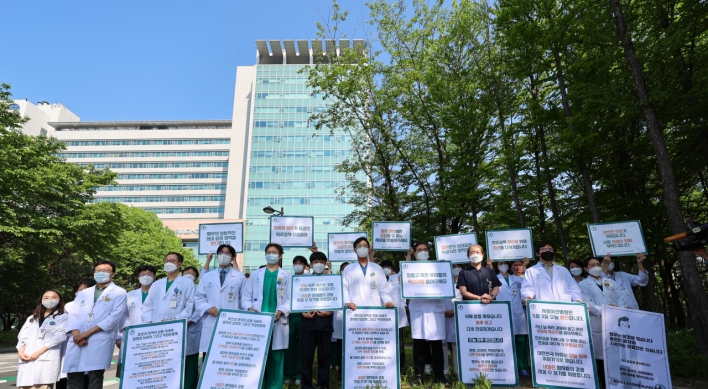More than 120 South Korean companies operating in Gaeseong industrial park are unlikely to be able to pay their North Korean workers as Pyongyang continues to block entry of vehicles from the South.
The 123 South Korean firms have paid North Korean employees’ salaries in cash on the 10th of each month.
They usually withdraw money from Woori Bank, which operates in Gaeseong, to transfer it to the North’s Central Special Direct General Bureau, which manages the industrial park.
“(South Korean) firms are expected to withdraw money from our Gaeseong branch tomorrow as scheduled,” said a Woori Bank official.
“But since the North is blocking entry of our cash transport vehicles, it will be difficult to pay the workers.”
About 53,000 North Korean employees currently work at the industrial enclave in Gaeseong. Their average monthly income is $140. Including overtime and special pay, the total amount of wages paid each month comes to between $8 million and $9 million.
“Although the standard date for salaries is the 10th (of the month), most companies pay them between the 18th and the 20th,” said a senior official at Woori Bank.
“Because our Gaeseong branch doesn’t have much cash, if the North continues to block entry until then, the companies won’t be able to pay the workers on time.”
In that case, the North is likely to demand the companies pay the overdue wages with interest for arrears, raising another point of controversy between the South and North.
South Korean firms, on the other hand, are not going to accept that, as the North is responsible for the delayed payments.
They plan to apply a “no work, no pay” rule if the North Korean workers pull out from the factories.
Each of the 123 South Korean companies is estimated to have invested at least 5 billion won ($4.4 million) in Gaeseong. Their combined output last year amounted to $469.5 million.
In addition to the losses from halted production, they might lose customers and face claims for damages, something they have feared for years every time the North has raised threats.
An economic research institute affiliated with the Industrial Bank of Korea said in 2009 that if the industrial complex was shut down, the total damage would amount to 6 trillion won including about 1 trillion won invested by the companies and in building the infrastructure, and the rest from the firms’ losses and suppliers going bankrupt.
A shutdown would cause the North an economic loss of some $90 million per year and jobs for 53,000 people and their families.
A ruined industrial park would no doubt deal a blow to Pyongyang’s efforts to attract foreign investment to its special economic zones.
By Kim So-hyun (sophie@heraldcorp.com)
The 123 South Korean firms have paid North Korean employees’ salaries in cash on the 10th of each month.
They usually withdraw money from Woori Bank, which operates in Gaeseong, to transfer it to the North’s Central Special Direct General Bureau, which manages the industrial park.
“(South Korean) firms are expected to withdraw money from our Gaeseong branch tomorrow as scheduled,” said a Woori Bank official.
“But since the North is blocking entry of our cash transport vehicles, it will be difficult to pay the workers.”
About 53,000 North Korean employees currently work at the industrial enclave in Gaeseong. Their average monthly income is $140. Including overtime and special pay, the total amount of wages paid each month comes to between $8 million and $9 million.
“Although the standard date for salaries is the 10th (of the month), most companies pay them between the 18th and the 20th,” said a senior official at Woori Bank.
“Because our Gaeseong branch doesn’t have much cash, if the North continues to block entry until then, the companies won’t be able to pay the workers on time.”
In that case, the North is likely to demand the companies pay the overdue wages with interest for arrears, raising another point of controversy between the South and North.
South Korean firms, on the other hand, are not going to accept that, as the North is responsible for the delayed payments.
They plan to apply a “no work, no pay” rule if the North Korean workers pull out from the factories.
Each of the 123 South Korean companies is estimated to have invested at least 5 billion won ($4.4 million) in Gaeseong. Their combined output last year amounted to $469.5 million.
In addition to the losses from halted production, they might lose customers and face claims for damages, something they have feared for years every time the North has raised threats.
An economic research institute affiliated with the Industrial Bank of Korea said in 2009 that if the industrial complex was shut down, the total damage would amount to 6 trillion won including about 1 trillion won invested by the companies and in building the infrastructure, and the rest from the firms’ losses and suppliers going bankrupt.
A shutdown would cause the North an economic loss of some $90 million per year and jobs for 53,000 people and their families.
A ruined industrial park would no doubt deal a blow to Pyongyang’s efforts to attract foreign investment to its special economic zones.
By Kim So-hyun (sophie@heraldcorp.com)
-
Articles by Korea Herald










![[K-pop’s dilemma] Time, profit pressures work against originality](http://res.heraldm.com/phpwas/restmb_idxmake.php?idx=644&simg=/content/image/2024/05/08/20240508050705_0.jpg&u=20240508171126)








